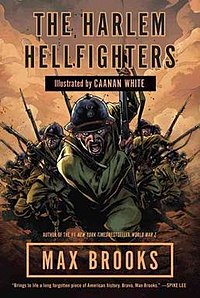The Harlem Hellfighters
by Max Brooks
The novel is narrated by Mark, a veteran of the 369th's tour in Europe. It begins upon the inception of [[U.S. involvement in World War I]], with recruitment for the 15th New York National Guard Regiment being held in [[Harlem, New York]]. The soldiers, though all black, come from a diverse array of backgrounds, classes, and cultures, leading to some initial internal strain. The 15th is headed by Lieutenant Adams and Sergeant Mandla.
In July 1917, the regiment commences basic training at Camp Whitman, where they are strictly disciplined and educated by a benevolent Adams. Concurrently, members of the regimental band are subjected to the precise training of renowned bandleader Lt. James Europe. It's here that the African-American soldiers begin to first feel the effects of segregation with the United States Army; they are given uniforms later than their white counterparts and train with broomsticks in the place of rifles.
In October, the regiment is reassigned to riot in Houston. In order to preserve the well-being of his men, Lt. Adams orders them to completely ignore any verbal or physical provocations made by the local populace. Mark and several of his fellow infantrymen are subject to a vicious beating at the hands of townsmen that is only broken up when white soldiers from the 7th Infantry Regiment intervene.
After a handful of weeks in Spartanburg, the 15th is deployed to France. When they reach the Western Front in January 1918, the regiment is bitterly assigned to laborious roles, unloading ships and performing janitorial tasks for the American Expeditionary Force.
After months more of "pick and shovel work," the 15th is reorganized into the 369th Infantry Regiment and transferred under the jurisdiction of the French Fourth Army. The French soldiers show a foreign level of acceptance and tolerance of theblack presence. Mark's friend David Scott is killed by a sniper on their first day in the trenches whilst naively peeking into no man's land.
The 369th is soon taken aback by the brutal realities of war; the rat-infested, muddy, lice-encompassed trenches become a subject of much complaining. Nonetheless, the soldiers soon prove themselves in combat. Private Henry Johnson becomes the first American to receive the Croix de Guerre after dispatching a German "raider party" armed solely with a bolo knife and rifle, saving the lives of multiple comrades. This results in the 369th's rise to prominence on both sides of the war, with the Germans nicknaming them the Harlem Hellfighters. As the war progresses, bombings and gas attacks become part of the 369th's daily routine.
The African American soldiers soon face intense discrimination from their white counterparts; they are eventually barred altogether from social interactions with the friendlier French. Mark is soon arrested by military police after defending himself against a provocation by white soldiers. A frustrated Mark, insisting that he is fighting a "white man's war", transfers to a labor unit.
Anticipating the Second Battle of the Marne, the Expeditionary Force formulates a plan to retreat from the would-be German assaulted forward trenches whilst bombarding German supply roads. However, in order for this to be executed, the Americans must enforce the illusion that the trenches are still stocked with men by placing a "volunteer unit" left behind. Lt. Adams subsequently volunteers the 369th for this duty. Shortly before combat commences, Mark returns to his regiment, who rides out German bombardment of the forward trenches completely unscathed.
Immediately afterwards the 369th participates in the perilous Allied counterattack, with Sgt. Mandla being killed in the process.
The novel ends with a series of conclusory panels, dictating that the Harlem Hellfighters spent 191 days in combat, were the first Allied unit to reach the Rhine, and that they received a victory parade upon their return home to New York.
